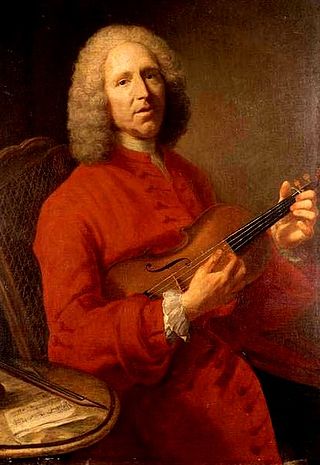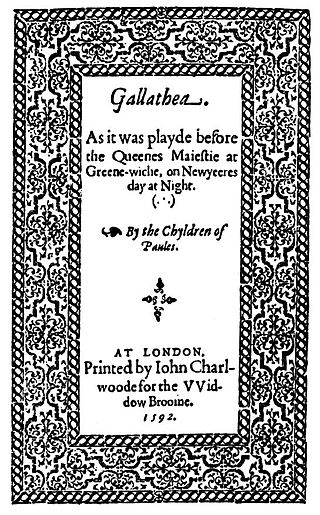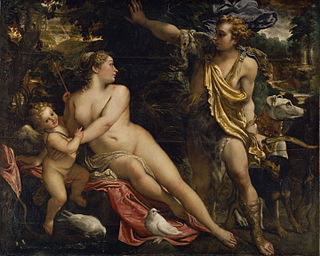Characters

Shepherds
Philisses
Lissius
Forester
Lacon
Rustic
Arcas
Shepherdesses
Musella
Simeana
Silvesta
Climeana
Dalina
Phillis
Musella's Mother
Temple of Love
Venus
Cupid
Priests
Love's Victory is a Jacobean era pastoral closet drama written circa 1620 by English Renaissance writer Lady Mary Wroth. The play is the first known original pastoral drama and the first original dramatic comedy written by a woman. [1] It is written primarily in rhyming couplets. There are only two known manuscripts of Love's Victory, one of which is an incomplete version located in the Huntington Library in San Marino, California. The other version is complete, and is the Penshurst Manuscript which is owned by Viscount De L'Isle, indicating continued ownership by the Sidney family since its creation. [2]
The play is not as widely read as Wroth's prose romance Urania or her romantic sonnet sequence Pamphilia to Amphilanthus , but has been receiving more attention with the increasing interest in early modern women writers. Love's Victory received its first professional performance on 16 September 2018 at Penshurst Place in Kent, where it is thought that Wroth wrote the play in 1618. [3]
Love's Victory begins with the goddess Venus commanding her son Cupid to cause a group of shepherds and shepherdesses in Cyprus [4] heartache and suffering for not showing her enough reverence. The action then shifts to how Cupid has affected the various characters. After a series of misunderstandings and deceptions among the characters, Venus and Cupid show themselves and reveal their work in achieving, in the end, "Love's Victory." [5] Venus's priests act as a chorus throughout the play.

Philisses
Lissius
Forester
Lacon
Rustic
Arcas
Musella
Simeana
Silvesta
Climeana
Dalina
Phillis
Musella's Mother
Venus
Cupid
Priests
...
Venus is upset because of the shepherds' and shepherdesses' apparent recent lack of attention towards her, and orders her son Cupid to make them victims to his will. In doing so, she hopes to regain their reverence. Philisses is soon affected by Cupid's arrows, and forlornly swoons for Musella, whom he loves, but who he believes loves Lissius. Lissius recognises Philisses's anguish as heartache, and vows never to fall victim to it. Meanwhile, Silvesta, who has recently been rejected by Philisses, has taken a vow of chastity to become a follower of the goddess Diana, much to the chagrin of Forester, who loves her. Philisses, Dalina, Rustic, Lacon and Climeana decide to play a game in which each person reveals through song their past loves. Venus re-enters berating Cupid for not causing enough characters pain, especially Lissius, who is openly scornful of love. Cupid vows to do so.
Several of the shepherds and shepherdesses witness Forester being rejected by Silvesta, who explains to him her vow of chastity to Diana. Arcas enters and asks the other characters to draw fortunes that he brought. Philisses leaves and is followed by Lissius. When Lissius catches up to him, Philisses reveals his fear that Musella's love lies with Lissius. Lissius, in turn, reveals that it is not Musella he loves, but Philisses's sister, Simeana. Philisses, now relieved, promises to help Lissius win Simeana. The act ends with Venus' priests proclaiming Cupid's power.
Musella questions Silvesta's chaste lifestyle, and claims that true chastity is found in love. Silvesta responds by pitying Musella, saying that she's blinded by love. Musella admits that she loves Philisses, and tells Silvesta that she knows Philisses thinks she loves Lissius. Silvesta tells Musella that Philisses walks in a certain spot every morning, and that she should meet him there one morning and be kind to him. Philisses continues to bemoan his situation. Dalina, Climeana, Simeana and Phillis decide to play a game in which they confess their secrets about who they love. Dalina claims to have been in love two unknown shepherds at the same time. Phillis admits to being in love with Philisses. Climeana proclaims that she is still in love with her ex-lover, Lissius, while Simeana admits that she, too, is in love with Lissius. This leads to a verbal fight between the two of them. Lissius enters and dismisses Climeana's immediate advances. Climeana, Phillis and Dalina leave, and Lissius reveals to Simeana his heartache caused by his love for her. Simeana at first appears sceptical of his love, but soon relinquishes and admits her love for him. Soon after, Venus tells Cupid that Lissius had not suffered enough prior to obtaining his love. Cupid agrees to cause Lissius more suffering.
Musella hides in the place where Silvesta said Philisses would be. Philisses enters and continues to decry his situation. Musella reveals herself to him, and they both admit their love for each other, but decide to keep it a secret to all but Silvesta. Rustic enters, but soon leaves with Philisses. Lissius and Simeana join Musella, but Simeana quickly leaves, suddenly angry. Simeana begins to distrust Lissius' vows of love, saying that he made the same vows to Climeana. Musella convinces Simeana to trust Lissius, and they make up. More shepherds and shepherdesses enter, and they decide to play a game of riddles. Rustic is unable to form a riddle. They agree to all meet up the next day. Venus and Cupid re-enter and proclaim that they are almost done testing the characters.
Musella is in great distress and is complaining to Simeana. Musella's mother is forcing her to marry Rustic. Musella reveals that her mother claims it is written her father's will that she must marry Rustic. Philisses enters and is confronted with the sad news. Musella and Philisses agree to go to the temple of Venus and "bind our lives, or else our lives make free". Rustic happily encounters Lissius, Dalina and Arcas and tells them of his upcoming marriage to Musella. Arcas reveals that Musella rejected his love in the past, and Lissius and Dalina begin to suspect he's somehow responsible for the marriage. Meanwhile, Climeana and Lacon tell Silvesta of Musella's and Rustic's marriage. Silvesta leaves to intercept Philisses and Musella at the temple. Philisses and Musella are at the temple praying to Venus and Cupid, and prepare to kill themselves when Silvesta shows up and gives them a potion which she says will give them an easy death. Philisses and Musella drink the potion and seemingly die. Simeana enters and sees the bodies, and proclaims that Silvesta must die for what she has done. The rest of the shepherds and shepherdesses arrive at the temple. They grieve for Philisses and Musella. Musella's mother reveals that Arcas told her Musella wantonly sought Philisses' love, which is what coerced her into forcing Musella into marrying Rustic. Later, Silvesta is about to be burned at the stake for the deaths of Philisses and Musella when Forester enters and offers to take her place, which Silvesta accepts. However, Venus and Cupid quickly enter, waking Philisses and Musella from their sleep. The play closes with Forester vowing to continue to love Silvesta, even if it is unrequited, Philisses and Musella promising to wed, as well as Lissius and Simeana, and Dalina and Rustic. Venus promises Arcas that, for his treachery, he will be punished. [2] [5]
One often discussed aspect of Love's Victory is its relation to Wroth's other works, the works of her family members, and the family members themselves. Wroth, who in life had an affair with her cousin William Herbert, recreated her love on the page in more than one venue. For instance the title characters in Pamphilia and Amphilanthus and Musella and Philisses in this play. Further, it is believed that the character of Rustic, who is unrefined and dull, is based on Wroth's husband, Sir Robert Wroth, whom she didn't get along with. [7] Further, some comparisons can be drawn to her uncle's, Sir Philip Sidney, own romantic sonnet sequence, Astrophel and Stella , specifically in the characters of Musella, Forester and Silvesta. [2] Even the title characters of Wroth's own sonnet sequence are identical to the protagonists of her prose romance Urania. [1]
At the end of the play, four different couples are paired up, each signifying a different kind of love. [2]
Musella + Philisses = True love
Simeana + Lissius = Flawed love
Silvesta + Forester = Chaste love
Dalina + Rustic = Comic love
If the connections to Wroth's life are charted here, then she considered her marriage to her husband Robert (Rustic) comical, whereas her extended affair with her cousin William Herbert (Philisses) was true love.

Venus is a Roman goddess, whose functions encompass love, beauty, desire, sex, fertility, prosperity, and victory. In Roman mythology, she was the ancestor of the Roman people through her son, Aeneas, who survived the fall of Troy and fled to Italy. Julius Caesar claimed her as his ancestor. Venus was central to many religious festivals, and was revered in Roman religion under numerous cult titles.

François Boucher was a French painter, draughtsman and etcher, who worked in the Rococo style. Boucher is known for his idyllic and voluptuous paintings on classical themes, decorative allegories, and pastoral scenes. He was perhaps the most celebrated painter and decorative artist of the 18th century.

Lady Mary Wroth was an English noblewoman and a poet of the English Renaissance. A member of a distinguished literary family, Lady Wroth was among the first female English writers to have achieved an enduring reputation. Mary Wroth was niece to Mary Herbert née Sidney, and to Sir Philip Sidney, a famous Elizabethan poet-courtier.

King Arthur, or The British Worthy, is a semi-opera in five acts with music by Henry Purcell and a libretto by John Dryden. It was first performed at the Queen's Theatre, Dorset Garden, London, in late May or early June 1691.

Venus and Adonis is an opera in three acts and a prologue by the English Baroque composer John Blow, composed no later than 1684 and no earlier than 1681. It was written for the court of King Charles II at either London or Windsor Castle. It is considered by some to be either a semi-opera or a masque, but The New Grove names it as the earliest known English opera.

As the last in the famed collection of sonnets written by English poet and playwright William Shakespeare from 1592 to 1598, Sonnet 154 is most often thought of in a pair with the previous sonnet, number 153. As A. L. Rowse states in Shakespeare's Sonnets: The Problems Solved, Sonnets 153 and 154 "are not unsuitably placed as a kind of coda to the Dark Lady Sonnets, to which they relate." Rowse calls attention to the fact that Sonnets 153 and 154 "serve quite well to round off the affair Shakespeare had with Emilia, the woman characterized as the Dark Lady, and the section of the Dark Lady sonnets". Shakespeare used Greek mythology to address love and despair in relationships. The material in Sonnets 153 and 154 has been shown to relate to the six-line epigram ascribed to Marianus Scholasticus in the Greek Anthology. The epigram resembles Sonnets 153 and 154, addressing love and the story of Cupid, the torch, and the Nymph's attempt to extinguish the torch.
Le Roi Candaule is a Grand ballet in four acts and six scenes, with choreography by Marius Petipa and music by Cesare Pugni. The libretto is by Jules-Henri Vernoy de Saint-Georges and is based on the history of King Candaules the Ruler of Lydia, as described by Herodotus in his Histories.

La naissance d'Osiris, ou La fête Pamilie is a one-act opera by Jean-Philippe Rameau, first performed on 12 October 1754 at Fontainebleau to celebrate the birth of the future King Louis XVI. The libretto is by Rameau's frequent collaborator Louis de Cahusac. Cahusac styled the work a ballet allégorique, but it is usually categorised as an acte de ballet. Its slender plot tells of Jupiter's announcement to a group of Egyptian shepherds of the birth of the god Osiris, who symbolises the baby prince. The piece may have started life as part of a larger work, Les beaux jours de l'Amour, an opéra-ballet Rameau and Cahusac planned but never completed for reasons which are still uncertain.

Zéphire is an opera by Jean-Philippe Rameau in the form of a one-act acte de ballet. Nothing is known about the date of its composition, and it was probably not performed in Rameau's lifetime. The name of its librettist is also unknown but may possibly have been Louis de Cahusac.

The Maid's Metamorphosis is a late Elizabethan stage play, a pastoral first published in 1600. The play, "a comedy of considerable merit," was published anonymously, and its authorship has been a long-standing point of dispute among scholars.

Gallathea or Galatea is an Elizabethan era stage play, a comedy by John Lyly. The first record of the play's performance was at Greenwich Palace on New Year's Day, 1588 where it was performed before Queen Elizabeth I and her court by the Children of St Paul's, a troupe of boy actors. At this point in his literary career, Lyly had already achieved success with his prose romance Euphues and was a writer in residence at Blackfriars theatre. The play is set in a village on the Lincolnshire shore of the Humber estuary and in the neighboring woods. It features a host of characters including Greek deities, nymphs, fairies, and some shepherds.
The Faithful Shepherdess is a Jacobean era stage play, the work that inaugurated the playwriting career of John Fletcher. Though the initial production was a failure with its audience, the printed text that followed proved significant, in that it contained Fletcher's influential definition of tragicomedy. Like many of Fletcher's later tragicomedies, The Faithful Shepherdess deals with the darker side of sexuality and sexual jealousy, albeit within a comic framework.
The Knight of Malta is a Jacobean era stage play, a tragicomedy in the canon of John Fletcher and his collaborators. It was initially published in the first Beaumont and Fletcher folio of 1647.
Rosaline is a fictional character mentioned in William Shakespeare's tragedy Romeo and Juliet. She is the niece of Lord Capulet. Although an unseen character, her role is important: Romeo's unrequited love for Rosaline leads him to try to catch a glimpse of her at a gathering hosted by the Capulet family, during which he first spots her cousin, Juliet.

In classical mythology, Cupid is the god of desire, erotic love, attraction and affection. He is often portrayed as the son of the love goddess Venus and the god of war Mars. He is also known as Amor. His Greek counterpart is Eros. Although Eros is generally portrayed as a slender winged youth in Classical Greek art, during the Hellenistic period, he was increasingly portrayed as a chubby boy. During this time, his iconography acquired the bow and arrow that represent his source of power: a person, or even a deity, who is shot by Cupid's arrow is filled with uncontrollable desire. In myths, Cupid is a minor character who serves mostly to set the plot in motion. He is a main character only in the tale of Cupid and Psyche, when wounded by his own weapons, he experiences the ordeal of love. Although other extended stories are not told about him, his tradition is rich in poetic themes and visual scenarios, such as "Love conquers all" and the retaliatory punishment or torture of Cupid.
Pamphilia to Amphilanthus is a sonnet sequence by the English Renaissance poet Lady Mary Wroth, first published as part of The Countess of Montgomery's Urania in 1621, but subsequently published separately. It is the second known sonnet sequence by a woman writer in England. The poems are strongly influenced by the sonnet sequence Astrophel and Stella (1580) penned by her uncle Sir Philip Sidney. Like Sidney's sequence, Wroth's sonnets passed among her friends and acquaintances in manuscript form before they were published in 1621. In Wroth's sequence, she upends Petrarchan tropes by making the unattainable object of love male.

Venus, Adonis and Cupid is a painting created c. 1595 by Annibale Carracci. The painting is in the Museo del Prado, Madrid. Annibale Carracci was one of the most well known Italian Baroque painters of the seventeenth century. The Carracci brothers established an academy of art called Accademia degli Incamminati, which pioneered the development of Bolognese Painting. Annibale Carracci and Caravaggio were among the most influential artists of this century, who through their unique artistic styles led to the transition from Mannerist to Baroque. Annibale was born in Bologna in 1560 and died in Rome in 1609.

The Feast of Venus is an oil on canvas painting by Flemish painter Peter Paul Rubens, created in 1635–1636, now in the Kunsthistorisches Museum in Vienna. It is a fanciful depiction of the Roman festival Veneralia celebrated in honor of Venus Verticordia.
Méduse, tragédie en musique (Medusa) is an opera by the French composer Charles-Hubert Gervais (1671-1744), ordinaire de la Musique of the Duc de Chartres. The opera was first performed at the Académie Royale de Musique on 13 January 1697. It takes the form of a tragédie en musique in a prologue and five acts. The libretto, by the dramatist Abbé Claude Boyer (1618-1688), concerns the Greek myth of Medusa.
The Countess of Montgomery's Urania, also known as Urania, is a prose romance by English Renaissance writer Lady Mary Wroth. Composed at the beginning of the 17th century, it is the first known prose romance written by an English woman. The full work exists in two volumes, the first published in 1621 and the second written, but unpublished, during Wroth's lifetime. The novel also contains several versions of Wroth's sonnet sequence Pamphilia to Amphilanthus, distributed throughout the prose and reproduced in sequence at the end of the volume.